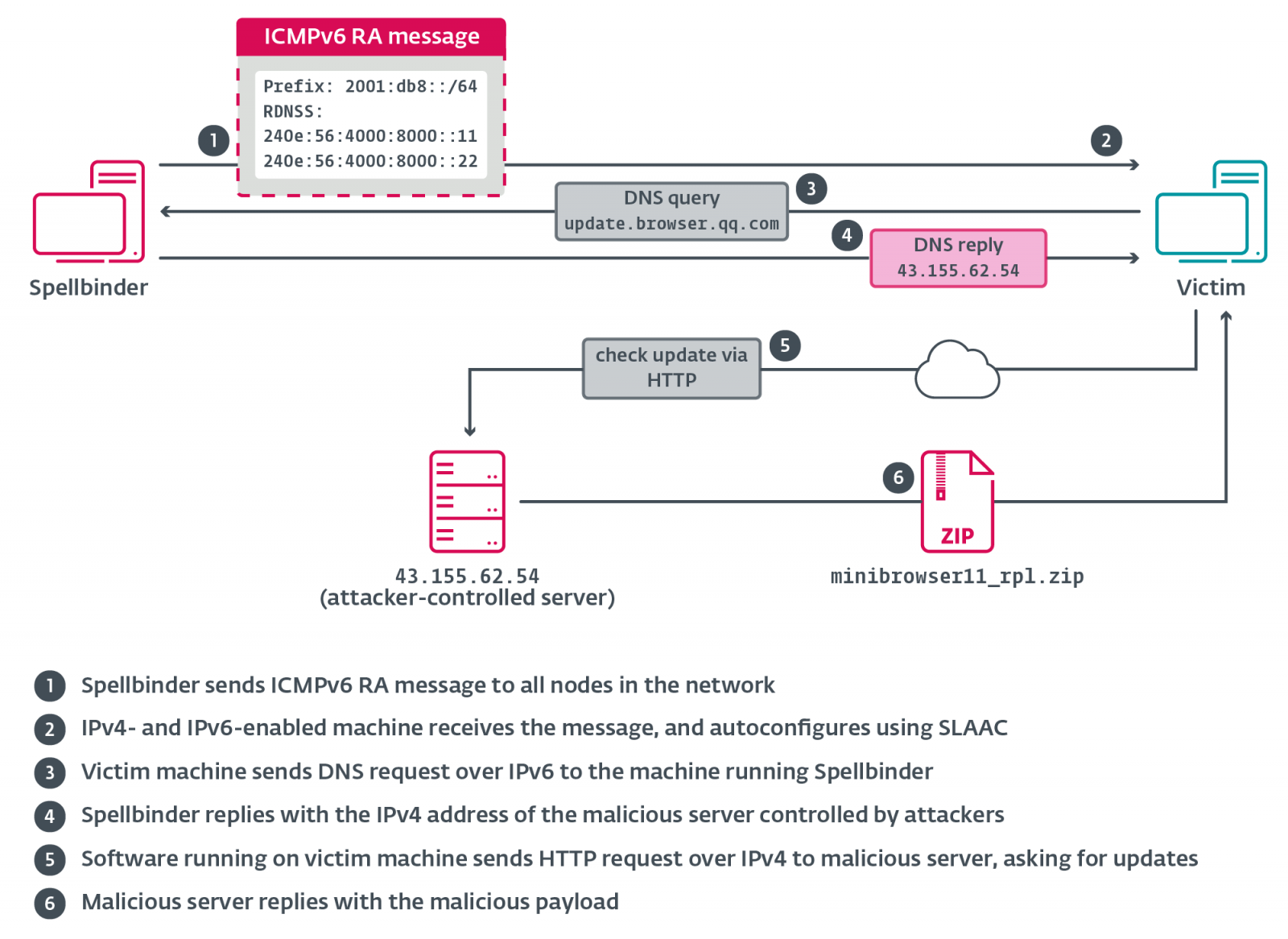
A China-aligned APT risk actor named “TheWizards” abuses an IPv6 networking function to launch adversary-in-the-middle (AitM) assaults that hijack software program updates to put in Home windows malware.
In response to ESET, the group has been lively since a minimum of 2022, focusing on entities within the Philippines, Cambodia, the United Arab Emirates, China, and Hong Kong. Victims embody people, playing corporations, and different organizations.
The assaults make the most of a customized device dubbed “Spellbinder” by ESET that abuses the IPv6 Stateless Tackle Autoconfiguration (SLAAC) function to conduct SLACC assaults.
SLAAC is a function of the IPv6 networking protocol that enables units to robotically configure their very own IP addresses and default gateway with no need a DHCP server. As an alternative, it makes use of Router Commercial (RA) messages to obtain IP addresses from IPv6-supported routers.
The hacker’s Spellbinder device abuses this function by sending spoofed RA messages over the community, inflicting close by methods to robotically obtain a brand new IPv6 IP handle, new DNS servers, and a brand new, most popular IPv6 gateway.
This default gateway, although, is the IP handle of the Spellbinder device, which permits it to intercept communications and reroute site visitors by means of attacker-controlled servers.
“Spellbinder sends a multicast RA packet each 200 ms to ff02::1 (“all nodes”); Home windows machines within the community with IPv6 enabled will autoconfigure by way of stateless handle autoconfiguration (SLAAC) utilizing data supplied within the RA message, and start sending IPv6 site visitors to the machine operating Spellbinder, the place packets might be intercepted, analyzed, and replied to the place relevant,” explains ESET.

Supply: ESET
ESET stated assaults deploy Spellbinder utilizing an archive named AVGApplicationFrameHostS.zip, which extracts right into a listing mimicking respectable software program: “%PROGRAMFILESpercentAVG Applied sciences.”
Inside this listing are AVGApplicationFrameHost.exe, wsc.dll, log.dat, and a respectable copy of winpcap.exe. The WinPcap executable is used to side-load the malicious wsc.dll, which masses Spellbinder into reminiscence.
As soon as a tool is contaminated, Spellbinder begins capturing and analyzing community site visitors making an attempt to attach particular domains, equivalent to these associated to Chinese language software program replace servers.
ESET says the malware screens for domains belonging to the next corporations: Tencent, Baidu, Xunlei, Youku, iQIYI, Kingsoft, Mango TV, Funshion, Yuodao, Xiaomi, Xiaomi Miui, PPLive, Meitu, Quihoo 360, and Baofeng.
The device then redirects these requests to obtain and set up malicious updates that deploy a backdoor named “WizardNet.”
The WizardNet backdoor provides attackers persistent entry to the contaminated system and permits them to put in extra malware as wanted.
To guard towards a lot of these assaults, organizations can monitor IPv6 site visitors or flip off the protocol if it isn’t required of their atmosphere.
In January, ESET additionally reported on one other hacking group named “Blackwood” hijacking the WPS Workplace software program replace function to put in malware.

